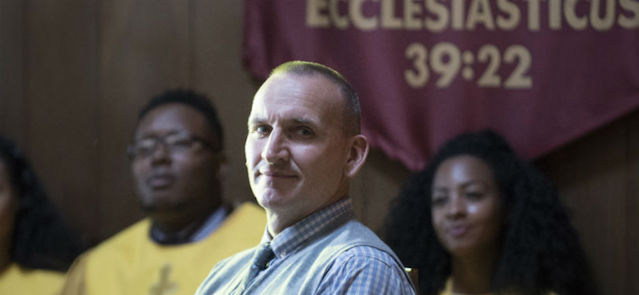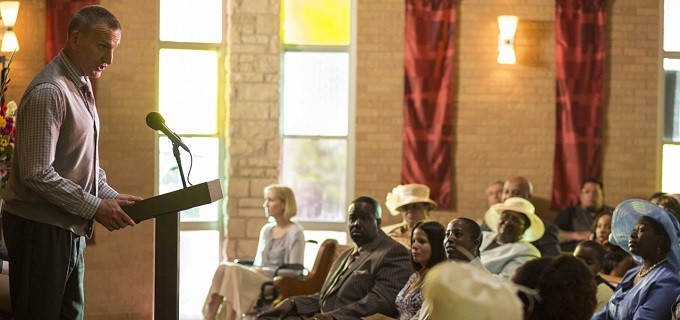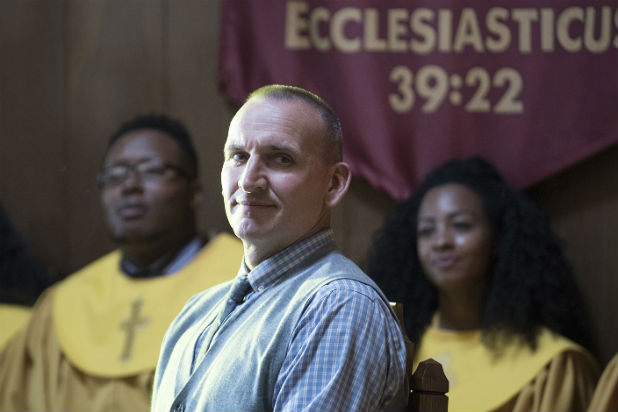

We decided a while ago to limit most of our television coverage to the weekender column. Get suckered by a clever plot device enough times and you learn that writing about a show mid-season is not unlike reviewing an album after hearing only a song or two. But I’m breaking that rule today. I couldn’t not break it after watching the most recent episode of The Leftovers, “No Room at the Inn.” Talk about bait! Spoilers follow.
- When Damon Lindelof shared last month that he was suffering a bout of depression while writing The Leftovers pilot, no one batted an eye. That first season was BLEAK. I know I wasn’t the only one waiting to read a review or three before committing to the second season. But the initial round-ups were glowing, so here we are.
- One of the chief frustrations of the first season, at least for those of us interested in the religious dimension, was the recurrence of the doubt/faith “debate” we were made to stomach on Lindelof’s previous show, LOST. It felt tone-deaf then, and it feels that way now. But we’ve gone into all that before.
- What changed, however, was that Damon had decided to include an actual Christian clergyman in the drama this time around, The Rev. Matt Jamison, an Episcopal priest played with glaring intensity (and distracting accent) by Christopher Eccleston. The characterization of Matt in the first season was grating but sincere. Neither a charlatan nor much of an evangelist (despite his best efforts), Jamison is a true believer thrust into an impossible situation, someone who means well but for whom nothing is easy–partly of his own doing. I wouldn’t go so far as to call it a “positive” portrayal of a clergyman, but it wasn’t hugely negative either. Still, at the end of the season the question remained, was he going to be an actual character or a vehicle for the writers’ sentiments about God? The man resembled no Episcopal priest I’d ever met.

A curious banner
- This is not to say Matt altogether lacked dimension though: we find out early on that he is the 24/7 caregiver for his catatonic wife, Mary. He feeds her, bathes her, nurses her–the show goes out of its way to impress upon us how arduous the process is. Matt is clearly a devoted and loving husband. One-way love all the way. Yet he’s no saint. His relationship with his sister is fraught, and he often seems willing to sacrifice the wellbeing of others for the sake of his “cause”–establishing that the Departure was not so much a rapture as a test. His theology comes to the fore in those moments: his God is capricious, or at least, highly tempermental. Life, for him, is an agonizing process of discerning God’s will in all sorts of everyday minutiae, the opposite of assurance.
- In other words, for Matt (and possibly the show) God’s disposition toward human beings is nothing like Matt’s toward Mary. It’s more like that of a dangerous, aloof professor interacting with misbehaving students in a darkened classroom. God is something to be suffered, and Lindelof waste no opportunity to telegraph the Job parallels. Yet Matt’s faith remains resolute, almost maniacally so. Sounds fun, right?
- Not sure how intentional it is, but this most recent episode gave us the show’s first taste of grace, most of which revolves around two substitutions. The first comes after Matt finally gives up on trying to game another miracle from on high, or unlock divine favor (AKA Mary’s lucidity) via personal “obedience” to a pattern of behaviors. He decides to take his wife to the doctor outside of town, and on the way home encounters a father and son, broken down on the side of the road. Matt tries to help. They beat him up and steal his radiator and, more urgently, the wristband that allows him and Mary to live in Miracle, TX (the Bethlehem/Eden corollary). They steal his hope, you might say. Or destroy the idol of false hope, taking away the geographic place he had come to rely on over God.

- Toward the end of the episode, after breaking his way back into town, Matt comes across their attackers in an upturned car. The man who robbed him has been killed in an accident, his son hiding in the bushes. Matt takes the bracelet off the dead man and puts it on Mary (who he entrusts to his sister), and allows the boy to keep his, going so far as to procure sanctuary for the kid who hurt him so badly. Presumably we’re to think that this man has died in Matt’s place, what with all the (scape)goats lying around. It would/could/should have been him in that car.
- Then, in the final scene of the episode, Matt willingly leaves Miracle–the realm of the saved/spared–to attend to the Sodom-and-Gamorrah grotesquerie outside the town gates, an encampment of those who have been denied entry to “the blessed company”. It is a place where he and Mary had been supremely mistreated and humiliated. Anyway, Matt makes a bee-line for a scene he had witnessed earlier, that of a naked man being pilloried on top of an RV under a sign reading “repent”. It’s unclear but the man appears to be channeling the animus of the population. The only way this man can be freed, we’re told, is for someone to take his place. Which Matt does. He doesn’t know who the man is or what he has done, or even the reasoning behind the punishment. Having been shown grace, he is compelled to give it, and the form that grace takes is a substitution. It’s a powerful and unexpected scene, and what feels like the first ray of light in that particular character’s storyline. Instead of people suffering God, God is suffering people–he’s right there in the midst of the awfulness, being crucified–for the sake of the ones crucifying him. Matt has finally moved from Job to Jesus.
- Of course, who knows. This could be Matt’s way of “balancing the scales” or passing another test, making himself “worthy” of Mary waking up. I wouldn’t put it past Lindelof. The only reason I risk the post is because of the music that played over these closing scenes. It’s this tune:
P.S. That has got to be the first time Berkeley Divinity School has been mentioned on HBO. Go YDS!

Sign up for the Mockingbird Newsletter
COMMENTS
5 responses to “A Leftover Episcopalian on HBO: Notes on The Rev. Matt Jamison”
Leave a Reply













“Good thing I didn’t say I’m a Lutheran!” <—-my favorite line.
That line cracked me up. And people say the show has no sense of humor!
Yeah, I’ve been wondering why he said Lutheran in particular — did he mean she’d be quizzing him on Luther’s Small Catechism too? 🙂
What do you-all think?